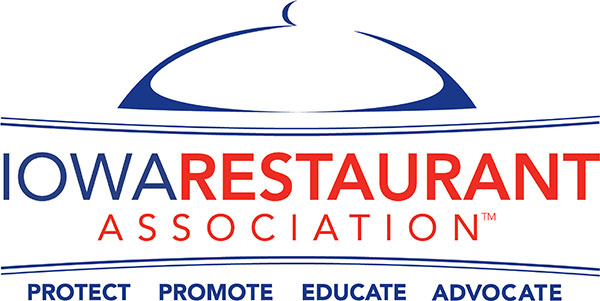The Iowa Restaurant Association today shared its preliminary assessment of the devastating toll the temporary suspension of on-premise food and beverage service has taken on Iowa’s hospitality industry. The Association surveyed operators of all sizes and concept types from across the state including restaurants, bars and other food and beverage establishments. 670 operators, or approximately 10% of the industry, participated in the survey.
“The picture is grim,” said Jessica Dunker, president and CEO of the Iowa Restaurant Association. “We knew the precautionary step that shuttered large portions of our industry in an effort to fight the spread of the Coronavirus would be detrimental, but our initial numbers indicate that for as many as 20% of our operators, there may be no coming back.”
The Iowa Restaurant Association Study Found:
- 35% of hospitality establishments (all categories) are currently closed
- 91% of bars are currently closed
- 82% of restaurants and bars have laid off employees
- Revenues across all types of concepts are down 84% when compared to March 2019
- Restaurants offering carryout for the first time are operating with skeleton crews and have still laid off as many as 90% of their employees
“Sixty-five percent of restaurants are trying to offer some sort of carryout or delivery, but only 6% of those surveyed are set up with a drive-thru,” said Dunker. “Turning a table service restaurant menu, kitchen, infrastructure, team, and business model into a carryout program is difficult to do overnight. Many of our restaurants are simply providing carryout to the community as a public service. There is no profit for a restaurant that a week ago averaged $15,000 in sales and is now doing $2,400 per week in take out.”
She added that the industry’s average net profit in good times is 5% so an operator selling $2,400 per week has a net profit of less than $100. “You don’t keep a business long with those numbers,” said Dunker.
Dunker emphasized the industry understands its important role in delivering nutritious meals to people. Before these on-premise service restrictions were put in place, 51% of every dollar spent on food was spent in the restaurant industry.
“I can’t imagine what would have happened in grocery stores if the restaurants hadn’t been allowed to provide carry out,” said Dunker. “They would have been even more overwhelmed.”
State Aid a Start, But Federal Funds Needed
The State of Iowa took a number of quick steps to attempt to assist Iowa’s hospitality sector including relaxing unemployment restrictions and penalties for employers and employees; expanding alcohol privileges to restaurants and bars to include carryout, delivery and drive-thru for beer, wine, and spirits; deferring sales, some property and state payroll tax payments; and creating a Small Business Grant Relief Fund. The Small Business Administration (SBA) is also offering a number of disaster relief programs.
But Dunker says Federal money will be needed if there is any hope for Iowa’s hospitality operators. “We need cash in hand to ensure rents, food costs, and employees get paid,” said Dunker.
The Association asked survey respondents to rank the steps that could be taken to help operators survive this unexpected business interruption. Two options immediately rose to the top.
- 46% said immediate reprieve for all tax obligations including but not limited to property, sales, unemployment and payroll taxes would offer the fastest help
And,
- 45% said direct relief aid for operational expenses including energy, rent, mortgages, food costs, etc. would be most helpful in keeping them open or helping re-open.
- Other priorities mentioned included the automatic extension of licenses, expanded alcohol privileges and a desire to repurpose alcohol profits to provide restaurant relief.
“We’ve appreciated the state and SBA’s first steps, but we’re anxiously awaiting to see what the Federal Coronavirus Aid, Relief, and Economic Security Act provides our industry,” concluded Dunker.
The Iowa Restaurant Association has been assisting hospitality operators through this difficult by serving as an advocate and resource. They have disseminated and assembled information on to their website, worked with state agencies, and are holding twice-weekly industry calls. They have also created a website “carryoutiowa.com” where operators can list their carryout information. The Association’s charitable foundation is in the process of setting up a designated displaced workers fund which will be launched by the weekend.












